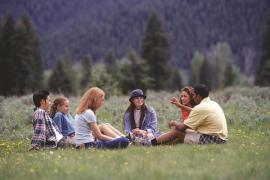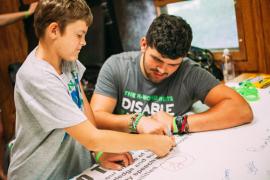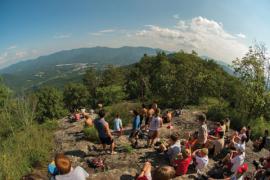Camp, when done well, is an opportunity to make a lasting impact on children’s lives. We’ve all seen the data that confirms the incredible power camp has in helping children to develop social-emotional learning (SEL) skills. We also know that camp can have an even greater impact on the seasonal staff who return to camp year after year. And yet, it feels like maybe we’ve lost sight of this in the last decade.
Internal and external pressure has shifted our focus toward the business of camp; we’ve allowed ourselves to get swept away by societal expectations we feel we must meet, or camp as we know it will cease to exist. And I get it. It was daunting enough to be responsible for providing an enriching camp experience for hundreds of children and stewarding millions of dollars in assets in normal times. Now, we must do it in a time of massive societal shifts and dramatic physical and mental health issues. The pressure has never been greater.
Are you familiar with the object lesson about the three pots of boiling water? A potato is placed in one pot of boiling water, an egg in the second, and a teabag in the third. The boiling water changes the potato and the egg, but the teabag changes the water. What if we stopped for a moment to remember why we do what we do? What if we decided to refocus and regain our purpose? What if, instead of the external pressure changing us, we changed the world?
When it started as a program at the YMCA in 1885, camp was a bunch of kids, some adults, a bit of equipment, and the woods. That was it. It wasn’t complicated. It wasn’t fussy. It wasn’t expensive. Fast-forward to today, and we often have complicated business models, and we spend more time building new, expensive facilities / program areas than maintaining current structures and systems. We sell the idea to donors that these structures and things are crucial only to find many of these “essential needs” in disrepair within 10 years. We get upset that our parent organizations don’t understand camp or when they question whether its cost is still worth it. So much of our attention and focus in recent years has been given to building projects and program additions (which is not entirely bad — our roles do require us to be good business leaders) that some of us have begun to focus less on youth development. Which is, you know, the point of camp.
Youth development is about building character and developing decision-making and critical thinking skills that require trial and error, and even failure, to truly understand. The time to learn these skills is during childhood when the risk is low and the openness to learning is high. In the curated environment of camp, children (and frankly, young staff) should be able to learn by making mistakes. In fact, camp should be the safest place to make a mistake. Sounds simple, doesn’t it?
This simple idea — that camp is a safe place for children to learn and make mistakes — gets complicated when you add in the pressure camps face to create an environment in which nothing bad ever happens and no one has uncomfortable feelings. To meet these expectations, our campers are surveilled constantly. They always have adult supervision to manage their experiences, guide their choices, and solve problems. When something inappropriate does happen, swift justice is expected, which usually results in the removal of the perpetrator, so we can all move quickly back to a world of only good feelings and no social struggles. It’s strange, isn’t it? Most camps have at least one high adventure element — a climbing wall, zipline, or ropes course — with perceived risk that enables campers to challenge themselves. We are completely fine with offering the uncomfortable feelings that arise from facing these obstacles, because it is “challenge by choice,” right? These experiences are great, but they do not reflect reality. In the real world of other people, not all challenges are by choice. So, what can we do?
We need to provide youth with the opportunity to choose their behavior and process the rewards or consequences of those choices. Our curated environment shouldn’t be expected to eliminate all conflict or poor choices; it should provide a safe place for campers to learn how to work through them. I once heard it put this way: “If I can’t say no, then my yes means nothing.” So, if a child doesn’t have the option to make the wrong choice because of the over-structured environment, then their compliance with the rules means nothing. We have to teach self-governance and personal responsibility so that even when no one is watching, youth choose to do the right thing — so they become adults who do the right thing.
We have to de-weaponize zero tolerance and cancel culture. The idea of zero tolerance should not equate to a child’s instant removal from the camp experience when they do something wrong, but rather that the behavior is not tolerated and should be addressed. We have to teach kids how to give and receive grace and mercy, how to allow forgiveness without lowering the expectations of good citizenship, and how taking personal responsibility is critical to moving forward. We need to help young people find internal strength instead of allowing them to outsource their sense of self-worth and identity to other people and other things.
Finally, we should remember that the antidote to adverse childhood experiences (ACEs) is positive childhood experiences (PCEs). We have the opportunity to provide thousands of children with a multitude of PCEs in one week of camp. Overcoming obstacles and facing challenges can be powerful PCEs depending on how we respond to and leverage these situations.
The future is bright, because it has not yet been written. The legacy you leave as a camp leader is before you. What will it be? As for me, I want to change the world for the better. I want to be the tea.
Laura Mahan is the director of strategy and quality practices for the YMCA of the USA’s Overnight Camping Network Experience.



